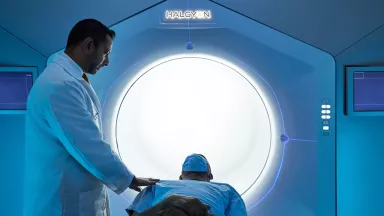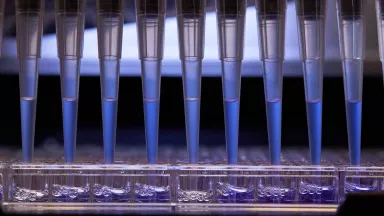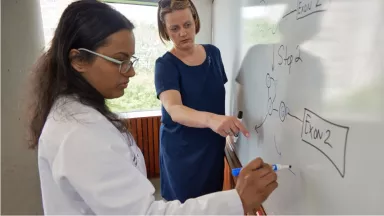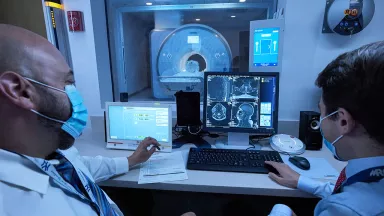Colorectal Cancer Screening
Access screening tests and preventive care for colorectal cancer at Montefiore Einstein Comprehensive Cancer Center. You’ll find a full range of advanced risk assessments, screening options, education and support at our NCI-designated comprehensive cancer center, ranked in the top 1% of all hospitals in the nation for cancer care according to U.S. News & World Report for our excellence in colon cancer surgery. Our comprehensive approach shows we’re dedicated to colon cancer prevention and early detection.
Colorectal Cancer Screening Program
Screenings are key to ensuring positive outcomes for colon cancer. Our dedicated colorectal cancer screening program offers access to screening throughout the year.
Each March, during Colon Cancer Awareness Month, and throughout the year, we host events and workshops to help people in our community understand their risk factors and the importance of screening.
We also host a yearly event in partnership with the Colon Cancer Foundation. During this event, guests can explore the inside of a colon through the larger-than-life “rollin’ colon” display.
About Colorectal Cancer Prevention & Screening
The rate of colorectal cancer is growing in many communities, but there are steps you can take to reduce your risk of getting the disease:
- Maintain a healthy weight
- Get enough calcium and vitamin D
- Stay physically active
- Eat a healthy diet
- Don’t smoke
- Limit alcohol use
Guidelines recommend that men and women at average risk start screening by age 45 or sooner if they are at higher risk. When diagnosed early, colon cancer is very curable.
High Risk for Colorectal Cancer
People with a parent, sibling or children with colorectal cancer are two to three times more likely to develop colorectal cancer. A family or personal history of colon polyps or certain chronic digestive conditions, such as inflammatory bowel disease, can also increase your risk for colorectal cancer.
African Americans are diagnosed with colon cancer at a younger age and have higher negative outcomes compared to other groups. It is recommended that screenings start at age 40 for African Americans.
Colorectal Screenings We Offer
There are different types of tests that screen for colorectal cancer. Talk with your doctor about which screening test is right for you.
Screening options available at Montefiore Einstein Comprehensive Cancer Center include:
- Colonoscopy: This test lets your doctor see the inner lining of your large intestine. A thin, flexible tube with a camera is inserted into your rectum through the colon and the lower part of the small intestine. Colonoscopy can find areas of bleeding or inflammation, small growths called polyps, tumors and ulcers. Your doctor can take tissue samples and remove abnormal growths during the colonoscopy.
- Sigmoidoscopy: This test is like a colonoscopy. However, it only checks the inner lining of the rectum and the lower part of the colon.
- Stool tests: Several tests can check for blood and signs of cancer in the stool. If you have a positive result on a stool test, you will likely need a colonoscopy. Types include:
- Fecal immunochemical test (FIT)
- Fecal occult blood test
- Stool DNA test
- Virtual colonoscopy: CT scan or MRI tests create a 3D view of the lining of your large intestine and rectum. This test can find abnormal growths and cancers. It is also called CT colonography.
Your Colorectal Screening Results
Rest assured our team works quickly to evaluate colorectal cancer screening tests, so you get accurate answers about your health as soon as possible.
Your care team will reach out to you directly to share results and discuss the next steps. You can also review your results within Montefiore MyChart, our online patient portal.
If you do receive a colorectal cancer diagnosis, Montefiore Einstein Comprehensive Cancer Center offers comprehensive advanced care for colorectal and other gastrointestinal (GI) cancers.








